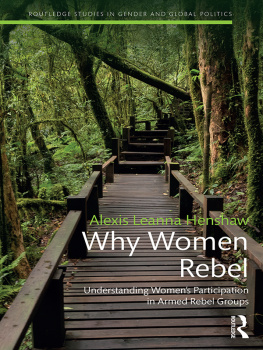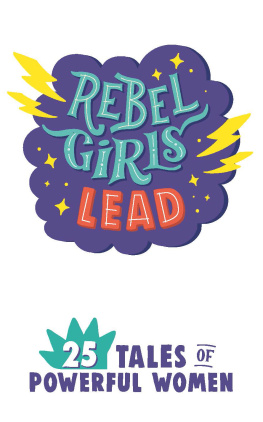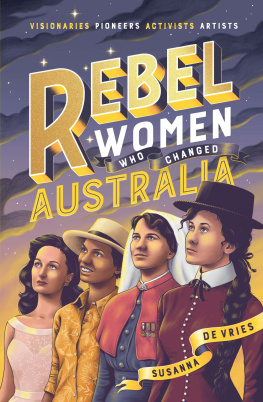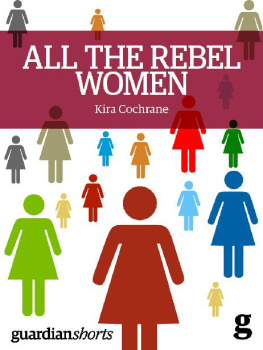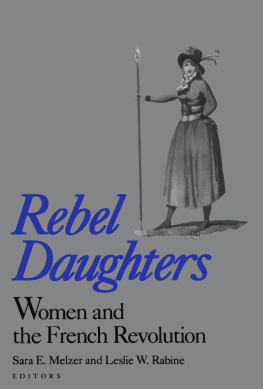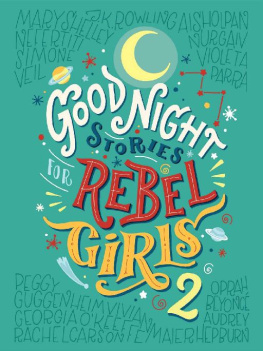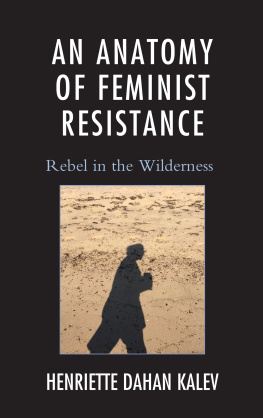Why Women Rebel
Why Women Rebel presents a global analysis of the extent to which women are engaged in armed, organized rebellions, and why they choose to join such rebellions. Henshaw has collected and analyzed data on womens participation in over 70 post-Cold War rebel groups and provides a theoretical analysis drawing upon both mainstream literature in the social sciences and critical, feminist inquiry on women and political violence to offer a new gendered theory on why women rebel.
The book demonstrates that women are active in well over half of all rebel groups sampled, and that while the majority of rebel groups have women serving in support roles away from direct combat, approximately a third of groups employ women in the conduct of armed attacks, and just over a quarter have women in a leadership capacity. Henshaw reaffirms the idea that women are more likely to be engaged in left-wing political organizations, but does suggest that more conservative or traditional movements may also successfully incorporate women by appealing to concerns about community rights.
This book will be of interest to academics in the fields of political science, international relations, security studies, and gender and womens studies.
Alexis Leanna Henshaw is Visiting Assistant Professor of Political Science at Miami University, United States. Her research is on topics related to women, sexuality, and security.
Routledge Studies in Gender and Global Politics
Series Editor: Laura J. Shepherd, UNSW Australia
This series aims to publish books that work with, and through, feminist insights on global politics, and illuminate the ways in which gender functions not just as a marker of identity but also as a constitutive logic in global political practices. The series welcomes scholarship on any aspect of global political practices, broadly conceived, that pays attention to the ways in which gender is central to, (re)produced in, and is productive of, such practices.
There is growing recognition both within the academy and in global political institutions that gender matters in and to the practices of global politics. From the governance of peace and security, to the provision of funds for development initiatives, via transnational advocacy networks linked through strategic engagement with new forms of media, these processes have a gendered dimension that is made visible through empirically grounded and theoretically sophisticated feminist work.
Masculinity and New War
The Gendered Dynamics of Contemporary Armed Conflict
David Duriesmith
Why Women Rebel
Understanding Womens Participation in Armed Rebel Groups
Alexis Leanna Henshaw
Feminism, Prostitution and the State
The Politics of Neo-Abolitionism
Edited by Eils Ward and Gillian Wylie
Why Women Rebel
Understanding Womens Participation in Armed Rebel Groups
Alexis Leanna Henshaw
First published 2017
by Routledge
2 Park Square, Milton Park, Abingdon, Oxon OX14 4RN
and by Routledge
711 Third Avenue, New York, NY 10017
Routledge is an imprint of the Taylor & Francis Group, an informa business
2017 Alexis Leanna Henshaw
The right of Alexis Leanna Henshaw to be identified as author of this work has been asserted by her in accordance with sections 77 and 78 of the Copyright, Designs and Patents Act 1988.
All rights reserved. No part of this book may be reprinted or reproduced or utilised in any form or by any electronic, mechanical, or other means, now known or hereafter invented, including photocopying and recording, or in any information storage or retrieval system, without permission in writing from the publishers.
Trademark notice: Product or corporate names may be trademarks or registered trademarks, and are used only for identification and explanation without intent to infringe.
British Library Cataloguing in Publication Data
A catalogue record for this book is available from the British Library
Library of Congress Cataloging in Publication Data
A catalog record for this book has been requested
ISBN: 978-1-138-20985-5 (hbk)
ISBN: 978-1-315-45661-4 (ebk)
For my parents, who were proud of me before I even started.
My thanks go out to the many people who supported this project on its way to completion. First and foremost are my parents, Mark and Sandra Henshaw, to whom this book is dedicated, and my grandmother Barbara Cuthbert. Their encouragement and moral support has made all things possible. Series editor Laura Shepherd and Routledge editors Lydia de Cruz and Emily Ross gave this project a home and helped make it what it is, and I am greatly indebted to them. My two research assistants at Bucknell University, Sean Xu and Alexa Gorski, likewise have my gratitude and appreciation for the hours of work they spent assisting me.
This research project began during my time as a graduate student at the University of Arizona, and Faten Ghosn, Gary Goertz, Miranda Joseph, and V. Spike Peterson were my greatest advocates there. Several other faculty members at Arizona had a significant influence on my work, and among them are Tom Volgy, Chad Westerland, Laura Briggs, and Yolanda Broyles-Gonzalez. The University of Arizonas library staff, including Cheryl Cullier, Robyn Huff-Eibl, and former Dean Carla Stoffle also deserve credit for their assistance finding some of the resources used in this project, and for being champions of graduate student research throughout the university even in the worst of financial times. Along the same lines, I again express my gratitude to the University of Arizonas Association for Women Faculty, to Katheryne B. Willock, and to the Feminist Theory and Gender Studies section of the International Studies Association for kindly recognizing and honoring early iterations of this project. That encouragement kept me motivated when I needed it the most. Special thanks to Colin Ellman, David Coller, and all those affiliated with the Institute for Qualitative and Multi-Method Research (IQMMR), who provided a space for methodological creativity back in 2011 when I was developing this project.
Several friends and colleagues offered invaluable support to me as I navigated the publishing process, and among them are Michael Slobodchikoff, Elena Hyman Renner, Spencer Bakich, Megan MacKenzie, David Mitchell, Caron Gentry, and Michael James. Readers may note that some of the research in this volume previously appeared in the articles Where Women Rebel: Patterns of Womens Participation in Armed Rebel Groups 19902008 (published in International Feminist Journal of Politics 18:1, 2016) and Why Women Rebel: Greed, Grievance, and Women in Armed Rebel Groups (published in Journal of Global Security Studies 1:3, 2016). Editors Laura Sjoberg and Deborah Avant, managing editors Catherine Jean and Jill Schmieder Hereau, and the staff and anonymous reviewers at those journals deserve credit for making my work stronger. The same could be said of the many conference friends I have made over the years at meetings including the International Studies Association Annual Meetings 200916, IQMMR 2011, the International Feminist Journal of Politics Conference 2015, the Journeys in World Politics workshop 2015 (coordinated by Sara Mitchell and Kelly Kadera), and the May 2016 workshop on Measurement and Conceptualization of Female Combatants, which I coordinated with Jessica Trisko Darden. The latter workshop was funded by American Universitys School of International Service and the International Studies Association, and helping to run that event gave me a new appreciation for the work of conference organizers. My most sincere thanks to the people who made these events possible. Your impact on emerging scholars is greater than you could imagine.

